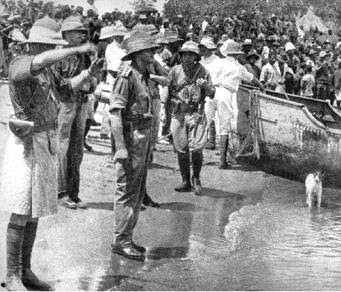At every morning brief, more ships sunk.
The enemy surrounds you as you starve.
Your ships and aircraft sit idle for lack of fuel and parts.
Through waves of attacks, a relief convoy comes ... and you wait.
Do they know your desperation? Will they make it? What can be done?
Well, in comes the US merchant marine professional, Captain Dudley Mason - the master of the tanker SS OHIO - and his crew and convoy.
For the details, let's look at the citation for his George Cross and the award to two of his crew, Frederick August Larsen, Jr., Junior Third Officer and Francis A. Dales, Deck Cadet-Midshipman on SS Santa Elisa/SS Ohio.
A little note about those two men, they were not originally part of the crew of the OHIO. They had been rescued from the SS SANTA ELISA when it was sunk. Then they volunteered to man the guns on the Ohio. Via WWIIToday:
During the passage to Malta of an important convoy Captain Mason’s ship suffered most violent onslaught. She was a focus of attack throughout and was torpedoed early one night. Although gravely damaged, her engines were kept going and the Master made a magnificent passage by hand-steering and without a compass.The George Cross citation is very brief, as is the British custom. More detail is available with Larsen and Dales' Merchant Marine Distinguished Service Medal citation;
The ship’s gunners helped to bring down one of the attacking aircraft. The vessel was hit again before morning, but though she did not sink, her engine room was wrecked. She was then towed. The unwieldy condition of the vessel and persistent enemy attacks made progress slow, and it was uncertain whether she would remain afloat.
All next day progress somehow continued and the ship reached Malta after a further night at sea. The violence of the enemy could not deter the Master from his purpose. Throughout he showed skill and courage of the highest order and it was due to his determination that, in spite of the most persistent enemy opposition, the vessel, with her valuable cargo, eventually reached Malta and was safely berthed.
His ship was a freighter carrying drums of high-octane gasoline, one of two American ships, in a small British convoy to Malta. Orders were to “get through at all costs.” Heavily escorted, the convoy moved into the Mediterranean, and before noon of that day the enemy’s attack began. From then on the entire convoy was under constant attack from Axis planes and submarines. Assigned the command of an anti-aircraft gun mounted on the bridge, Dales contributed to the successful defense of his ship for three days.Here's the twist. How did they get the OHIO back to port with this much damage?
At 4:00 A.M. on the morning of the fourth day, torpedo boats succeeded in breaking through and two attacked from opposite sides. Sneaking in close under cover of the darkness one opened point-blank fire on Dales’s position with four .50 caliber machine guns, sweeping the bridge and killing three of his gun crew in the first bursts. The other sent its deadly torpedo into the opposite side of the freighter. Neither the heavy fire from the first torpedo boat nor the torpedo from the second drove Dales and his crew from their gun. With only flashes to fire at in the darkness, he found the target and the first boat burst into flames and sank. But the torpedo launched by the other had done its deadly work. The high-test gasoline cargo ignited and the American ship was engulfed in flames. Reluctantly, orders were given to abandon her.
Two hours later, the survivors were picked up by a British destroyer, which then proceeded to take in tow a tanker [SS Ohio] that had been bombed and could not maneuver. After five hours constant dive-bombing, the tanker was hit again–her crew abandoned her–and the destroyer was forced to cut her loose. But the cargo she carried was most important to the defense of Malta, and it had to get through. The rescue destroyer and another destroyer steamed in– lashed themselves on either side of the stricken tanker–and dragged her along in a determined attempt to get her to port.
Dales and four others volunteered to go aboard the tanker and man her guns in order to bring more fire power to their defense. The shackled ships, inching along and making a perfect target, were assailed by concentrated enemy airpower. All that day wave after wave of German and Italian bombers dived at them and were beaten off by a heavy barrage. Bombs straddled them, scoring near misses, but no direct hits were made until noon the next day, when the tanker finally received a bomb down her stack which blew out the bottom of her engine room. Though she continued to settle until her decks were awash, they fought her through until dusk that day brought them under the protection of the hard fighting air force out of Malta.
Because of the vital importance of her cargo (10,000 tons of fuel which would enable the aircraft and submarines based at Malta to return to the offensive), she could not be abandoned. In a highly unusual manoeuvre, the two destroyers (HMS PENN and HMS LEDBURY) supported her to provide buoyancy and power for the remainder of the voyage.
Mission focused; mission first.
Fullbore.




























